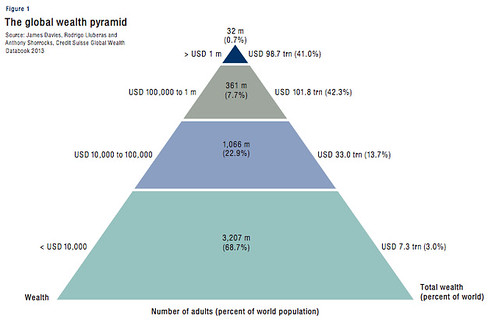David Seaton's News Links
 |
| Naquasia LeGrand... the right stuff |
Naquasia LeGrand, the lady that tops this page, works at minimum wage shoveling fried chicken, for KFC. She is leading a fight to organize fast-food workers and raise America's minimum wage to $15. She is facing some of America's most powerful multinational corporations and an ideological set enshrined in think-tanks, PACs and mainstream media which has prevailed in the USA since the days of Ronald Reagan and...
She looks like winning!
How could this happen? Not that complicated, really.
The price of elitist politics is that, in a democracy, or anything remotely resembling one, when issues become so simple and self-evident that "you don't need a weatherman to tell which way the wind blows": at that point the money's "gate-keeper" function no longer guarantees that numerically small, but powerful groups are able to achieve their desired outcomes.
This is the sort of opposition that Ms. LeGrand is facing:
Koch-backed political coalition, designed to shield donors, raised $400 million in 2012 - Washington Post
The political network spearheaded by conservative billionaires Charles and David Koch has expanded into a far-reaching operation of unrivaled complexity, built around a maze of groups that cloaks its donors, according to an analysis of new tax returns and other documents. (...) The resources and the breadth of the organization make it singular in American politics: an operation conducted outside the campaign finance system, employing an array of groups aimed at stopping what its financiers view as government overreach. Members of the coalition target different constituencies but together have mounted attacks on the new health-care law, federal spending and environmental regulations.
They must think that it's worth the expense.
How can a minimum wage worker like Naquasia LeGrand face anything like that, with even a ghost of a chance of succeeding?
The answer might be contained in an article about the right-wing political consultant,
Frank Luntz, that I came upon in "The Atlantic".
Few people are as in touch with American public opinion as Luntz is, he has made a fortune crafting his clients' messages to suit or bend that opinion. And, according to the article, Luntz, who spends a fortune on focus groups and polls is in the depths of a black dog depression because of what he is hearing and seeing.
This what his fine-tuned nose is sniffing:
But what if the Real People are wrong? That is the possibility Luntz now grapples with. What if the things people want to hear from their leaders are ideas that would lead the country down a dangerous road? "You should not expect a handout," he tells me. "You should not even expect a safety net. When my house burns down, I should not go to the government to rebuild it. I should have the savings, and if I don't, my neighbors should pitch in for me, because I would do that for them." The entitlement he now hears from the focus groups he convenes amounts, in his view, to a permanent poisoning of the electorate—one that cannot be undone. "We have now created a sense of dependency and a sense of entitlement that is so great that you had, on the day that he was elected, women thinking that Obama was going to pay their mortgage payment, and that's why they voted for him," he says. "And that, to me, is the end of what made this country so great." The Agony of Frank Luntz - The Atlantic
Serendipity? Coincidence? On the same day I read the piece about Frank Luntz, I read the following rave review in Slate by Matthew Yglesias about a book called
Social Democratic America.
What is the author's social democratic menu-shopping list, agenda, for the USA
- Universal health insurance
- Universal system of one year of paid
parental leave
- Universal early education
- Increased Child Tax Credit
- Universal sickness insurance
- Eased eligibility criteria for unemployment
insurance
- Wage insurance for unexpected drops in
income
- State-run supplemental defined-contribution
pension plans with automatic enrollment
- Extensive, personalized job search and
(re)training support
- Government as employer of last resort
- Minimum wage increased modestly and indexed
to inflation
- Earned Income Tax Credit extended farther up
the income ladder and indexed to average wages
or GDP per capita
- Higher benefit level for social assistance
(i.e. TANF-like programs)
- Reduced incarceration of low-level drug
offenders
- Affirmative action shifted to focus on
family background rather than race
- Expanded government investment in
infrastructure and public spaces
- More paid holidays and vacation time
This policy list would be par for the course in say, Sweden, which is certainly not a "
socialist" country and whose business community hosts
many a billionaire. The billionaire business folk of Sweden have no problem with Kenworthy's list, but their American counterparts like the Koch brothers are spending a fortune to paralyze the country's political system to avoid what they consider "socialism", "communism" or worse.
People in the USA, certainly the Tea Party, often confuse social-democracy with "socialism", however they are very different.
Socialism advocates state/public ownership of the means of production: for example, nationalizing the steel or automobile industry would be socialist. On the contrary, social-democracy is about "civilizing" capitalism.
Social democracy is anything but revolutionary, FDR's New Deal was considered largely social-democratic and many felt that, by his measures, Roosevelt saved the capitalist system from destroying itself. For this very reason, the hard left, like Marxist-Leninists, consider social democrats "
Judas goats" for the capitalist system. For them the harder the brand of capitalism, the easier it is to overturn; the Koch brothers are dream enemies for them.
If Frank Luntz is right about a sea change in American opinion, Naquasia LeGrand may win her fight and Kenworthy's list may be more than a pipe dream. DS


